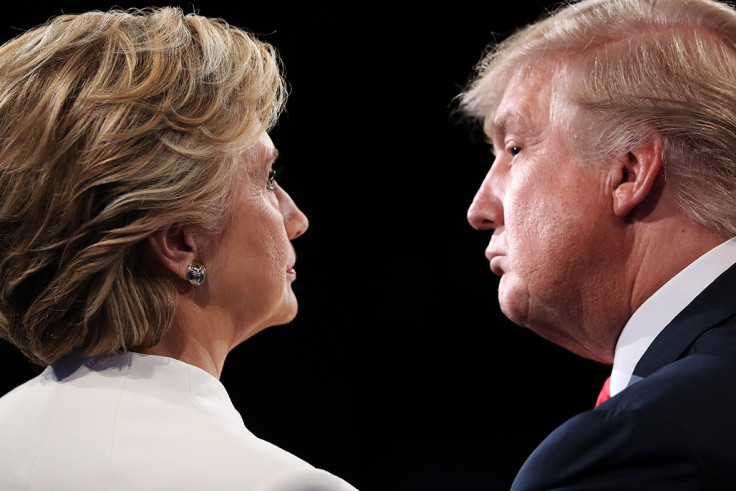Donald Trump and Hillary Clinton both offer their own special kind of awful
Whoever wins the presidency, a malaise has been brewing for some time under the guise of 'normal politics'.

The headlines from the final US presidential debate in Las Vegas last night have focused on Donald Trump's refusal to guarantee he will respect the outcome of the vote either way. But while this is indeed shocking – traditionally, participation in a democratic contest implies agreement to be bound by its rules – it is not surprising based on what we have seen so far. More importantly, this goes beyond a breach of etiquette by an abnormal candidate.
The Trump phenomenon is about more than one man, and the disgruntlement, disaffection and anger that propelled him this far will not simply dissipate even if he concedes gracefully in the event of a clear victory for Hillary Clinton. He knows his supporters don't want to hear him show respect for protocol and business as usual: that's not what he's there for.
A Clinton victory is the expected outcome, especially since the release of 'that video', but even if she wins easily, she will be possibly the most unloved president ever to be inaugurated. She now has the grudging support of a significant number of Republicans who simply want to vote for a 'normal' candidate, but even her Democratic supporters range from lukewarm to chilly towards her (genuine enthusiasts surely number no more than the opposing #NeverHillary camp).
She is running not on an agenda for change, or indeed continuity, but simply as an accomplished career politician (everything Trump is standing against). And her accomplishments have been very much as a politician.
Many commentators have praised Clinton's skill at deflecting attacks and baiting her opponent. Certainly this was in evidence in Las Vegas, where she responded to revelations that she had semi-secretly backed a free-trade and open-immigration zone for the Western hemisphere by focusing instead on the source of the revelations, namely WikiLeaks. This allowed her to draw attention to Trump's alleged affinity with Vladimir Putin, since US officials have blamed Russia for being behind the WikiLeaks attacks.
Trump rightly drew the audience's attention to this 'great pivot', but instead of coming back to the free trade zone, he was provoked by Clinton's accusation that he would be Putin's puppet. 'You're the puppet,' he said, like a four-year old, a line that will be remembered far longer than his more cutting observation that, 'Putin has outsmarted her in Syria every step of the way'. Indeed, Clinton has been intimately implicated in the failings of the Obama administration's foreign policy in recent years, from strategic ineptitude in the Middle East to reckless belligerence in the South China Sea. But Trump's lack of deeper knowledge or seeming interest in such matters leaves him ill-equipped to hold her to account.
Perhaps worse was Trump's failure to press home on the question of immigration, one of the issues that undoubtedly underlies his support. Clinton claimed the free trade zone that came up in WikiLeaks was only supposed to be about energy. It is unlikely that anyone believed her. For Clinton's style of politics, though, that doesn't matter. The point is that she had an answer that allowed her to keep her composure and move on to more comfortable territory. She is not actually a good debater, in the sense of someone able to persuade and convince. She is more like a WWE wrestler, giving the false impression of putting up a good fight.
However unappealing Trump is, a return to normal politics is unlikely to fix it.
There may in fact be a good case to be made for a free-trade and open-immigration zone, maybe even one that works for American workers as well as global capital. But politicians like Hillary Clinton are unwilling or unable to make that case. So they are left saying one thing to bankers gathered behind closed doors and another to the American public. Rather than making a case for more open borders, Clinton talked up her credentials as a champion of border security, while also making politically correct noises about not splitting up families or allowing undocumented workers to be exploited by people like Trump.
Tellingly, Trump was provoked less by these accusations than by Clinton's sentimentality, and he responded by pointing out both that she had previously voted for a version of his wall, and that President Obama had deported millions of immigrants, more than any previous US president. While this might have seemed to undermine Trump's suggestion that Clinton would open the borders, the point was rather to expose her hypocrisy, which contrasted sharply with his own straight-talking, un-PC persona, confirmed in this debate with talk of getting rid of "bad hombres".
In short, both candidates focused on the awfulness of the other, while each obliged the other by offering numerous examples of his or her own special kind of awful. Whoever wins the presidency, a malaise has been brewing for some time under the guise of 'normal politics'. However unappealing Trump is, a return to normal politics is unlikely to fix it.
Dolan Cummings is speaking at the debate "Can America Be Great Again?" at the Battle of Ideas Festival at the Barbican on Saturday 22 October, 10.00-11.30am. He is a professional speechwriter and an associate fellow of the Institute of Ideas.
© Copyright IBTimes 2025. All rights reserved.






















